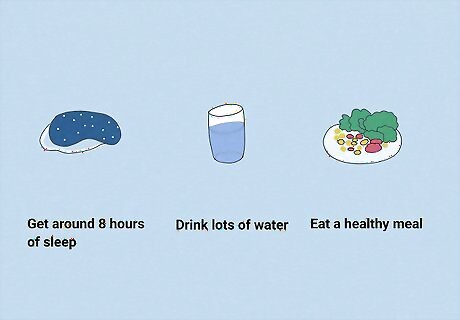
views
Here are 11 tips for keeping your nerves at bay.
Practice for anything that you’re nervous to do.

This makes you feel more ready and less nervous. Practice a presentation out loud in front of a mirror or in front of people you’re comfortable around, for example. Or, go out to a park and practice your shooting for an upcoming basketball game if that’s what’s making you nervous. If you’re nervous about an upcoming social engagement, you can practice how to introduce yourself to new people or practice some small talk in front of the mirror.
Give yourself a pep talk.

This can help push nervous thoughts out of your mind. For example, if you’re nervous for an upcoming athletic performance, tell yourself something like “I’ve got this!” or “You’re ready for this!” Or, if you’re nervous about trying something new like going hang gliding, tell yourself “This is going to be fun!” You can also try developing a mantra, or a phrase or set of words that help calm you, and using it every time you feel nervous about anything. For instance, repeat something like “You are strong.” over and over to yourself any time you get nervous.
Visualize success.

Positive thinking can decrease your negativity and nervousness. If you’re feeling nervous about something like an upcoming presentation or sports match, imagine it going super well for you. If negative thoughts come into your mind, push those out and continue visualizing yourself doing well. To help you do this, ask yourself: “What’s the best thing that can happen?” Then, focus on visualizing the most positive outcome that could happen from your upcoming performance.
Take deep, slow breaths.

This resets your nervous system to calm you down. Close your eyes and slow down your breathing rate to relax your mind and your body. Try breathing in through your nose for at least 4-5 seconds, then deeply exhale out of your mouth for as long as possible. Yoga practitioners around the world manipulate their breathing patterns every day in an effort to calm the mind. Long, peaceful breaths cue our minds and bodies that everything is okay. Short, harsh breaths do the opposite. By breathing correctly, you can tell your body how to feel. You can regulate your breath by counting to a certain number or repeating "Now I breathe in, now I breathe out."
Exercise early in the day.

Exercise boosts endorphins and reduces anxious feelings. Try relaxing exercises like yoga or tai chi. Or, go for a run or a bike ride or work out at a gym. Make it a goal to do about 30 minutes of physical activity a day. For example, if you’re nervous for an upcoming presentation you have to give in the afternoon, get up early and go for a run in the morning to alleviate your nervous feelings.
Write down your nervous thoughts.

Writing things down can help you let go of your worries. Get a writing utensil and a piece of paper and write down everything that’s making you feel nervous. Write down additional thoughts about why those things are making you feel nervous. Once you've written down your feelings, either throw the paper away as a symbolic gesture or keep it to consider it during the day. For example, if you’re nervous about an upcoming social event, write down what that event is and try to elaborate on why it’s making you feel nervous. Then, confront those feelings and try to let them go — they might seem less rational when you see them written down!
Focus on the present instead of living in the past or future.

What's done is done and what hasn't happened yet, well, hasn't happened. Don't stress yourself out by dwelling on an embarrassing moment or expecting to fail at something that’s coming up. Instead, focus on what you’re doing or what you can do in the present moment. There is such a thing as a self-fulfilling prophecy. If you concentrate on messing up your big speech tomorrow, you might end up messing up your big speech tomorrow. Focusing on the now grounds you in what's going on and lets you keep a level head.
Remember that it's natural to get nervous.

Nervousness is just anticipation for something that’s coming up. Try to practice self-compassion and recognize that you are bound to be nervous at some points in your life. It's a really natural reaction, so don't beat yourself up for feeling that way. If you notice physical reactions like your throat tightening, your palms sweating, or your stomach feeling knotted, remind yourself that those are just natural reactions caused by your nervous system — it doesn't mean your body is betraying you!
Get organized for upcoming performances.

The more organized you are, the less nervous you feel. For example, if you’re nervous for an upcoming presentation, get all your notes together, go over your presentation slides again, and make sure you have any props or visual aids you need ready to go. Or, if you’re nervous for your basketball game tomorrow, pack your uniform and other gear in a bag and place it by the door. A “performance” can be anything you have to do that’s making you feel nervous. For example, a party or other social event can be considered a social performance. You could pick out your outfit and brainstorm some topics of conversation to get organized for something like that. Beyoncé Knowles Beyoncé Knowles, Singer & Businesswoman If you experience nerves, channel them so that they fuel you. "I think it's healthy for a person to be nervous. It means you care – that you work hard and want to give a great performance. You just have to channel that nervous energy into the show."
Face your fears.

Avoiding things that make you nervous can just make those feelings worse. Instead, force yourself to do activities that make you nervous to overcome those feelings. Start small and work your way up to conquer bigger fears as you get more comfortable. For example, if social interaction makes you nervous, start small by just going to a party full of strangers with a friend of yours. Then, once you feel okay there, make it a goal to introduce yourself to at least 1 new person.
Take care of your basic needs.

Don’t let nervousness cause you to stop eating or sleeping. Do your best to get around 8 hours of sleep the night before any type of event that’s making you feel nervous. Stay hydrated by drinking lots of water and don’t skip meals! If you’re nervous before an event and it's really hard to eat a full meal, have a healthy, brain-boosting snack like a banana before instead. Avoid or limit caffeine and alcohol, which can both contribute to anxious feelings.




















Comments
0 comment